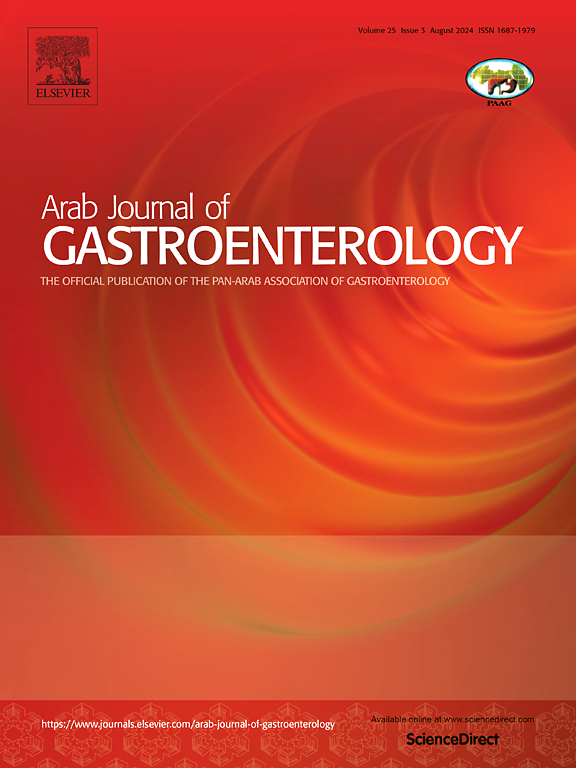一名接受英夫利昔单抗治疗的克罗恩病患者感染布鲁氏菌病:病例报告。
IF 1.1
4区 医学
Q4 GASTROENTEROLOGY & HEPATOLOGY
引用次数: 0
摘要
克罗恩病(CD)是一种炎症性疾病,可影响胃肠道的任何部位,并表现出多种症状。目前有多种治疗方法,包括生物治疗。使用生物制剂会增加机会性感染的风险,但与严重感染无关(1)。据我们所知,迄今为止还没有针对感染布鲁氏菌的 CD 患者积极使用生物制剂和免疫调节剂治疗的既定建议或病例研究。在此,我们报告了第一例在接受生物制剂和免疫调节剂治疗的 CD 患者中确诊的布鲁氏菌病。一名 40 岁的男性患者在过去八年中一直使用抗肿瘤坏死因子(anti-TNF)药物(即英夫利昔单抗和硫唑嘌呤)治疗 CD。在一次随访中,患者主诉食欲不振、发热、体重减轻和关节不适。患者称曾饮用生牛奶。血液培养显示有布鲁氏菌生长。患者停用了英夫利昔单抗和硫唑嘌呤,并开始接受布鲁氏菌病治疗,包括利福平 600 毫克,每天一次;强力霉素 100 毫克,每天两次;链霉素 1 克,每天肌肉注射。由胃肠病专家和传染病专家组成的多学科团队决定开始布鲁氏菌病治疗,并在开始布鲁氏菌治疗4周后恢复生物制剂和免疫调节剂的使用。本文章由计算机程序翻译,如有差异,请以英文原文为准。
Brucellosis in a patient with Crohn's disease treated with infliximab: A case report
Crohn's disease (CD) is an inflammatory disease that can affect any part of the gastrointestinal tract and presents with myriad symptoms. Various treatments, including biological treatments, are available. The use of biologics increases the risk of opportunistic infections, with no association with serious infections (1). To the best of our knowledge, there are no established recommendations or case studies for patients with CD infected with Brucella being actively treated with biologics and immunomodulators to date. Herein, we report the first case of brucellosis diagnosed in a patient with CD treated with biologics and immunomodulators.
A 40-year-old man had been treated with anti-tumour necrosis factor (anti-TNF) drugs, namely, infliximab and azathioprine, for CD for the past eight years. During a follow-up visit, the patient complained of loss of appetite, fever, weight loss, and joint discomfort. The patient reported a history of raw milk consumption. Blood cultures indicated the growth of Brucella species. Infliximab and azathioprine were held, and brucellosis treatment was initiated, including rifampin 600 mg once daily, doxycycline 100 mg twice daily, and streptomycin 1 g intramuscularly daily. A multidisciplinary team comprising gastroenterologists and infectious disease specialists decided to initiate brucellosis treatment and resume biologics and immunomodulators 4 weeks after starting Brucella treatment.
求助全文
通过发布文献求助,成功后即可免费获取论文全文。
去求助
来源期刊

Arab Journal of Gastroenterology
Medicine-Gastroenterology
CiteScore
2.70
自引率
0.00%
发文量
52
期刊介绍:
Arab Journal of Gastroenterology (AJG) publishes different studies related to the digestive system. It aims to be the foremost scientific peer reviewed journal encompassing diverse studies related to the digestive system and its disorders, and serving the Pan-Arab and wider community working on gastrointestinal disorders.
 求助内容:
求助内容: 应助结果提醒方式:
应助结果提醒方式:


